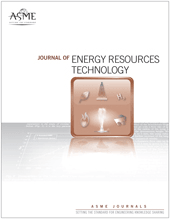
JOURNAL OF ENERGY RESOURCES TECHNOLOGY-TRANSACTIONS OF THE ASME
Scope & Guideline
Exploring the frontiers of mechanical and energy engineering.
Introduction
Aims and Scopes
- Energy Conversion and Management:
Research on technologies and methodologies for efficiently converting various forms of energy into useful power, including thermal, mechanical, and electrical energy. - Renewable Energy Technologies:
Studies focusing on the development and optimization of renewable energy sources such as solar, wind, geothermal, and biomass, including hybrid systems. - Combustion and Emission Control:
Research aimed at understanding combustion processes, improving efficiency, and reducing emissions in engines and industrial applications. - Energy Storage Solutions:
Exploration of various energy storage technologies, including thermal, chemical, and mechanical systems, to enhance energy management. - Hydrocarbon Recovery and Processing:
Innovative techniques in oil and gas recovery, including enhanced oil recovery methods, drilling technologies, and reservoir management. - Thermal and Fluid Dynamics:
Investigations into the thermal and fluid dynamics associated with energy systems, including heat exchangers, fluid flow in porous media, and thermodynamic processes. - Sustainability and Environmental Impact:
Assessment of the environmental impacts of energy technologies and development of sustainable practices in energy production and consumption.
Trending and Emerging
- Integration of Artificial Intelligence:
The application of AI and machine learning techniques in optimizing energy systems, predictive maintenance, and enhancing operational efficiency is rapidly growing. - Carbon Capture and Storage (CCS):
Research on technologies and methodologies for capturing and storing carbon dioxide emissions has gained importance as global efforts to combat climate change intensify. - Hybrid Energy Systems:
There is a growing interest in hybrid energy systems that combine multiple energy sources, such as solar and wind, to enhance reliability and efficiency. - Energy Efficiency Improvements:
Studies focused on improving the energy efficiency of existing systems, including industrial processes and power generation, are increasingly emphasized. - Sustainable Energy Solutions:
Research addressing sustainable practices in energy production, including waste-to-energy technologies and sustainable biomass utilization, is on the rise. - Thermal Energy Storage Technologies:
Innovations in thermal energy storage systems are gaining attention as crucial components for balancing energy supply and demand in renewable energy systems.
Declining or Waning
- Conventional Fossil Fuel Technologies:
Research related to traditional fossil fuel extraction and processing methods has seen a decline as the focus shifts towards renewable energy and sustainability. - Basic Thermodynamics:
Studies that cover fundamental thermodynamic principles without application to modern energy systems or technologies are less prevalent, as the field increasingly emphasizes applied research. - Static Energy Systems:
Research that focuses solely on static energy systems without considering dynamic interactions or integration with renewable sources is becoming less common. - Local and Regional Energy Studies:
There has been a noticeable decline in studies focused on localized energy issues, as the journal has increasingly prioritized broader, global energy challenges and solutions.
Similar Journals

Nafta-Gaz
Shaping the Future of Geosciences and Energy EngineeringNafta-Gaz is a leading academic journal published by the Institute of Oil and Gas, dedicated to advancing the fields of energy engineering, environmental engineering, fuel technology, and geosciences. With a strong emphasis on both theoretical and applied research, this journal serves as a critical resource for professionals, researchers, and students looking to deepen their understanding of contemporary challenges in oil, gas, and renewable energy sectors. Though currently categorized in the Q4 quartile across several relevant disciplines, including Energy Engineering and Geophysics, Nafta-Gaz is committed to fostering innovative discussions and pragmatic solutions that pertain to energy management, environmental policy, and technological advancements. Published in Poland, Nafta-Gaz is positioned amid the rapidly evolving energy landscape, providing a platform for the exchange of knowledge and best practices. The journal does not currently operate under an open access model, ensuring that content is curated for a specialized audience while maintaining the integrity of scholarly communication.

International Journal of Renewable Energy Research
Exploring the frontiers of renewable energy technology.International Journal of Renewable Energy Research (IJRER) is a distinguished peer-reviewed journal dedicated to advancing the field of renewable energy through innovative research and comprehensive analyses. Published by the esteemed INT JOURNAL RENEWABLE ENERGY RESEARCH, this journal has established itself as a vital resource for academics and industry professionals alike since its inception in 2011. With a focus on a wide array of topics in Energy Engineering and Power Technology and Renewable Energy, Sustainability and the Environment, IJRER has been recognized for its contributions, attaining a Q3 categorization in Energy Engineering and Power Technology and a Q4 rank in Renewable Energy for 2023. The journal is indexed in Scopus, demonstrating its global reach and impact, with notable rankings in both relevant categories. Researchers can access a wealth of valuable insights and findings that are crucial for fostering sustainable practices and technologies. Thus, IJRER plays a pivotal role in driving the future of renewable energy research and innovation.

Global Energy Interconnection-China
Connecting Innovations in Energy for a Sustainable FutureGlobal Energy Interconnection-China is an esteemed Open Access journal published by KEAI PUBLISHING LTD that focuses on the rapidly evolving fields of energy engineering and power technology. Since its launch in 2018, the journal has become a vital resource for researchers and professionals interested in sustainable energy solutions and innovative technologies, addressing the critical challenges facing the global energy landscape. With an impressive Q2 categorization in multiple engineering and energy-related disciplines, the journal ranks highly in Scopus, positioning itself as a leading platform for disseminating impactful research. Specifically, it excels in Automotive Engineering and Control and Systems Engineering, as evidenced by its competitive standing within the top quantiles of its fields. By leveraging its open access model, Global Energy Interconnection-China ensures that high-quality research is accessible to a worldwide audience, fostering collaboration and advancements in renewable energy, sustainability, and environmental conservation. For researchers, professionals, and students alike, this journal serves as a pivotal forum for sharing insights and innovations that shape the future of energy interconnection.

Problemele Energeticii Regionale
Transforming Energy Discourse through Open Access KnowledgeProblemele Energeticii Regionale is a notable academic journal focused on the field of energy engineering and sustainable energy solutions, published by the Institute of Power Engineering, Academy of Sciences of Moldova. Since its inception in 2005, this Open Access journal has become a significant platform for disseminating research and innovations in various energy-related domains, including renewable solutions, fuel technology, and energy sustainability. While its impact factor metrics suggest it currently resides in the Q4 quartile category across multiple scopes—such as Energy Engineering, Power Technology, and Renewable Energy—it provides critical insights that can pave the way for advancements in regional energy challenges. Researchers, professionals, and students alike will find this journal an essential resource for understanding and contributing to the ongoing discourse in the energy sector. With its commitment to accessibility and knowledge sharing, Problemele Energeticii Regionale aims to foster a collaborative and informed community focused on energy innovation and sustainability.
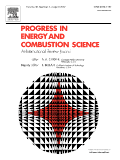
PROGRESS IN ENERGY AND COMBUSTION SCIENCE
Driving progress in energy and fuel technology.PROGRESS IN ENERGY AND COMBUSTION SCIENCE, published by PERGAMON-ELSEVIER SCIENCE LTD, stands as a premier journal in the realms of energy engineering and fuel technology, with an impressive impact factor and recognition across multiple scientific disciplinary matrices. Since its inception in 1975 and continuing through 2024, this esteemed publication has contributed significantly to the advancement of knowledge in energy resources, combustion processes, and their applications in modern technology. With a robust ranking of Q1 in key categories such as Chemical Engineering, Energy Engineering and Power Technology, and Fuel Technology, the journal consistently showcases high-quality research that influences both academia and industry. Researchers, professionals, and students benefit from its rigorous peer-reviewed articles, which foster a deeper understanding of energy-related challenges and innovations. Although it is not an Open Access outlet, its relevance and contribution to the scientific community are undeniable, making it a vital resource for anyone engaged in the pursuit of sustainable energy solutions.
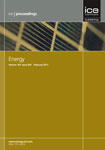
Proceedings of the Institution of Civil Engineers-Energy
Transforming energy landscapes with cutting-edge research.Proceedings of the Institution of Civil Engineers-Energy is a pivotal journal published by Emerald Group Publishing Ltd, focusing on the dynamic fields of energy engineering and power technology. With an ISSN of 1751-4223 and an E-ISSN of 1751-4231, this journal stands at the forefront of advancing research from 2008 to 2024, encapsulating critical insights into energy systems, sustainability, and innovative practices within the energy sector. The journal holds a commendable position in Scopus rankings, especially in the categories of Energy Engineering and Power Technology, with a Q3 quartile ranking reflecting its growing influence and relevance. Though currently not Open Access, it provides valuable content for researchers and professionals seeking to explore emerging trends and challenges in energy management and renewable resources. Aimed at bridging the gap between theoretical frameworks and practical applications, this journal is essential for anyone invested in the transformation of the energy landscape.
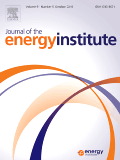
JOURNAL OF THE ENERGY INSTITUTE
Exploring Innovations in Renewable Energy and SustainabilityJOURNAL OF THE ENERGY INSTITUTE, published by Elsevier Science Ltd, is a leading interdisciplinary journal dedicated to the advancing fields of energy engineering and technology. With its ISSN 1743-9671 and E-ISSN 1746-0220, this journal has established a prominent reputation, evident from its impressive impact factor and strong rankings across multiple categories, achieving Q1 status in fields such as Condensed Matter Physics, Control and Systems Engineering, and Energy Engineering and Power Technology. As a pivotal resource for researchers, professionals, and students alike, the journal covers a comprehensive spectrum of topics in energy, including recent innovations in renewable energy technologies, sustainable practices, and advancements in fuel technologies. Researchers are encouraged to explore its open-access options for broad dissemination of knowledge, contributing to a more sustainable and energy-efficient future. With a converged history from 2004 to 2024, the JOURNAL OF THE ENERGY INSTITUTE remains a critical platform for cutting-edge research and development in the energy sector, promoting impactful solutions to global energy challenges.
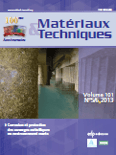
Materiaux & Techniques
Innovating the Future of Materials with Peer-Reviewed InsightsMateriaux & Techniques, published by EDP SCIENCES S A, is a prominent journal in the field of materials science, specifically focusing on diverse and innovative techniques in material development and application. With an ISSN of 0032-6895 and an E-ISSN of 1778-3771, this French journal serves as a key resource for researchers and professionals looking to advance their knowledge and share their findings within the community. The journal holds a Q3 ranking in Materials Science (miscellaneous), indicating its role in contributing to various facets of material science research amidst a growing field. Despite operating under a traditional access model, it provides a platform for rigorous peer-reviewed studies and significant advancements in material technology. With a publication history tracing back to the late 1970s and extending through to 2024, Materiaux & Techniques continues to uphold its commitment to fostering high-quality discourse and innovation in materials science.
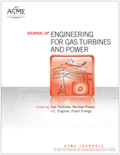
JOURNAL OF ENGINEERING FOR GAS TURBINES AND POWER-TRANSACTIONS OF THE ASME
Powering Innovation in Gas Turbines and BeyondJournal of Engineering for Gas Turbines and Power - Transactions of the ASME, published by the esteemed American Society of Mechanical Engineers (ASME), is a leading interdisciplinary journal dedicated to advancing the fields of energy engineering, aerospace, nuclear energy, and mechanical engineering. With an impressive history dating back to 1960 and continuing its contributions through 2024, this journal boasts a Q2 ranking in multiple engineering categories, reflecting its strong impact on both academia and industry. Although not an open-access journal, it provides invaluable insights and research findings that cater to the needs of professionals, researchers, and students alike. The journal's ISSN is 0742-4795 with an E-ISSN of 1528-8919, ensuring widespread visibility in the global academic community. Indexed in Scopus, it ranks notably within its fields—21st in Nuclear Energy and Engineering and 51st in Aerospace Engineering—underscoring its relevance and contribution to critical technological advancements. Researchers in this domain will find the journal a vital resource for innovative studies, practical applications, and the latest developments related to gas turbines and power generation.
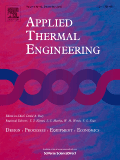
APPLIED THERMAL ENGINEERING
Advancing thermal innovation for a sustainable future.Applied Thermal Engineering is a leading international journal dedicated to the field of thermal engineering, published by Pergamon-Elsevier Science Ltd. With an impressive impact factor indicating its significance in the academic community, this journal focuses on innovative research and developments related to energy engineering, fluid flow, and transfer processes, as well as manufacturing and mechanical engineering. Being indexed in top quartiles (Q1) across multiple categories, it ranks exceptionally well on platforms like Scopus, ensuring that contributors reach a wide and relevant audience. The journal supports both open access and subscription options, promoting the dissemination of vital research findings from 1996 to 2024. With its commitment to advancing the discipline and implementing rigorous peer-review processes, Applied Thermal Engineering serves as an essential resource for researchers, industry professionals, and students aiming to stay abreast of the latest advancements and applied methodologies in thermal science.